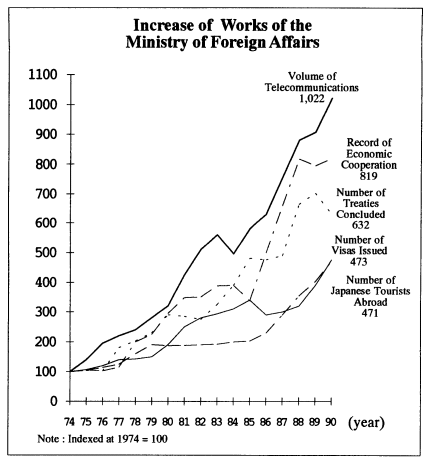
Chapter V. Institution for Foreign Policy Execution
1. Need to Strengthen Institution for Foreign Policy Execution
The Ministry of Foreign Affairs has to strengthen the institution for the execution of foreign policy to cope with the expanding diplomatic activities and to respond adequately to such emergencies as the Gulf Crisis. The first recommendation submitted by the Provisional Council for the Promotion of Administrative Reform (the third council) in July 1991, proposed that the Ministry should reassess the current institution and then undertake measures to improve and expand it in all its aspects, including that of personnel, so that Japan will be in a position to better meet the demand - promotion of its internationalization and assumption of more responsibilities that are commensurate with its national strength.
As the status of Japan rises in the international community, diplomatic activities are continuously expanding. The number of telegrams annually sent as a major means of communication between the headquarters and the diplomatic establishments abroad rose by more than 10 times in 1990 as compared with that in 1974. During the same period, the amount of Official Development Assistance increased by eight times, the number of signed international treaties and commitments by six times, and the number of issued visas by four times. The Ministry needs to enhance its capability to cope appropriately and swiftly with these regular duties, to extend active diplomacy, to participate vigorously in the making of a new international order, to collect and analyze information and research, and to respond adequately to emergencies such as the Gulf Crisis. Moreover, the fact that the number of overseas tourists has reached around 10 million and residents around 600,000 suggests that the Ministry needs to enhance its capability to protect Japanese citizens abroad, even though the Ministry can only offer assistance on top of their self-protection efforts and they need to recognize the harsh reality that they must first protect themselves. Thus, the strengthening of the institution for executing foreign policy is becoming more important.

The strengthening of the institution involves personnel increases and strengthening the function of overseas offices, as well as the consolidation of telecommunication systems and equipment to improve the system for crisis management. A budget increase must be realized in accordance therewith. In addition, thorough discussions as to what can really ensure diplomacy with mobility must be undertaken, including whether it is necessary to review and reform the institutions and the consciousness of the whole nation. In order to occupy an honorable position in the international community, Japan must execute consistent foreign policy, mustering all of its abilities available.
2. The Efforts in the Aspects of Organization, Personnel, and Budget
The Ministry of Foreign Affairs has been working on the enhancement of its function. The efforts that have been made throughout the past year to strengthen the institution for the execution of foreign policy in the aspects of organization, personnel and budget are as follows:
(1) Organization and Personnel
In the aspect of organization, four directorial level positions have been introduced in response to such new situations as increasingly complicated economic relations between Japan and the United States, the transformation of the European order, the full-scale development of the Japan-Soviet negotiations regarding the bilateral peace treaty, etc. In addition, a new consulate-general has been established in Miami (U.S.) and in Strasbourg (France). The number of diplomatic establishments abroad has risen to 176 in total, which consists of 107 embassies and 61 consulate-general offices, 2 consulate offices and 6 permanent representative offices. In order to achieve an increase in the number of its personnel, which is essential to the strengthening of institution for foreign policy execution, the Ministry cited the following purposes as its priority: to respond to the dramatic changes taking place in the Soviet Union and Central and Eastern European countries; to restructure the Japan-U.S. relationship and promote the global partnership between the two countries; to respond to the increase in tension in the Middle East; and to expand the international cooperation initiatives. Thus, despite the current tight budget and personnel constraints, personnel is to be increased by 110 in total with 24 in the headquarters and 86 abroad respectively in fiscal 1991 (Note).
(2) Budget
Despite the continuously stringent fiscal condition, the Ministry has achieved a budget increase for the fiscal 1991 budget by \42.4 billion (up by 7.9 percent) as compared with the previous fiscal year as a result of endeavors that it made to expand budget steadily, especially for three pillars: personnel increase, strengthening of the functions of the diplomatic establishments and promotion of international cooperation (cooperation for peace, expansion of Official Development Assistance and promoting cultural exchanges, etc.). The fiscal 1991 budgetary appropriation of the Ministry totaled \576.4 billion.
In addition, special attention has also been paid to strengthening the functions related to information and improving the system for the treatment of Japanese abroad (safety measures, education system for children abroad, etc.).